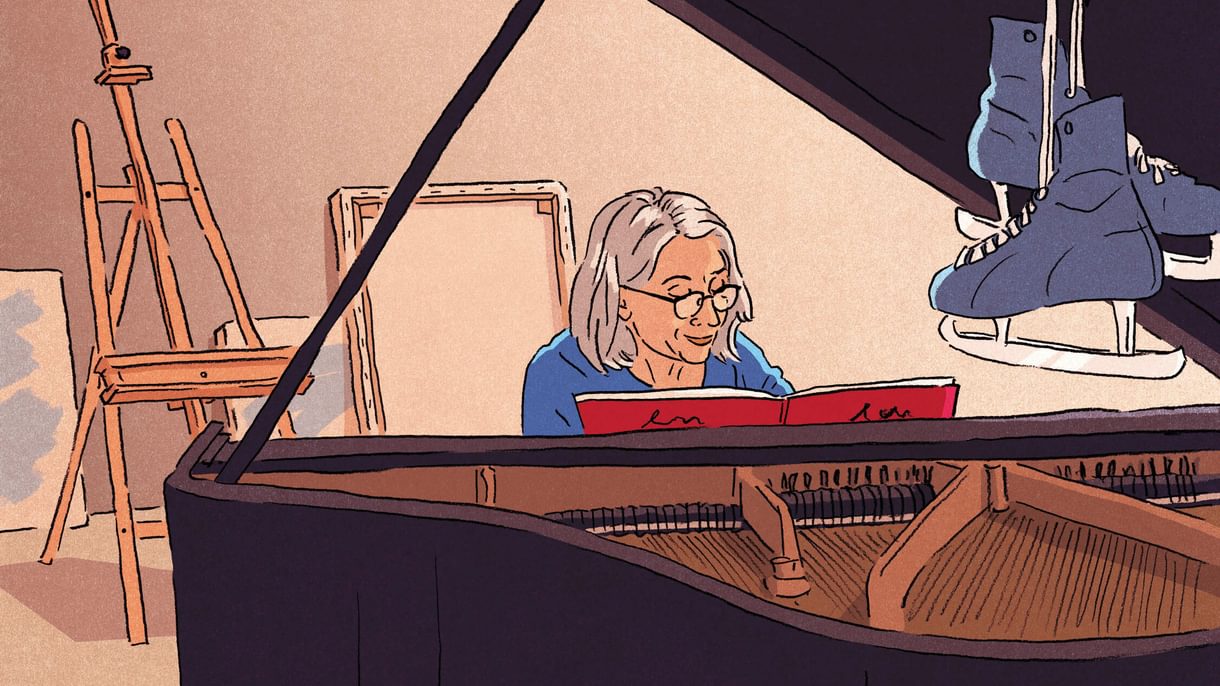Jody Strakosch ’79 wants you to sit down and have a serious conversation with yourself.
For 15 years, Strakosch has been a consultant for WISER, the Women’s Institute for a Secure Retirement, a nonprofit dedicated to education and advocacy for the long-term financial quality of life for women. She’s also the principal of Strakosch Retirement Strategies, a retirement benefits consulting firm working with investment management businesses.
“Most women don’t make as much money as men, and when they do retire, they’re going to live longer than men—at least three years, on average,” Strakosch says. “Living longer and not having as many resources can lead to a very minimal lifestyle in retirement.” Another concern is over-reliance on Social Security: Among women beneficiaries age 65 and older, 44% receive 50% or more of their income from Social Security, and 15% rely on it for 90% or more of their income. Financial advisors typically recommend that 40% of retirement income be from Social Security.
Strakosch says women need to set aside time to take an honest look at how much money they have. “And that is hard. It’s really hard,” she says. They need to ask, “What are my expenses? Where do I want to live 10 years from now? What kind of lifestyle am I envisioning? Do I want to travel around the world for three years? What if something happens to me financially, or I can’t work anymore, or if I need to go into a nursing home? How am I going to pay for that? These are not fun conversations,” she says.
As the baby boomers—those Americans born between 1946 and 1964—reach and surpass traditional retirement age, millions of them are facing these challenging questions. And it’s on Wellesley alums’ minds: These days, when to retire is a frequent topic of discussion in class notes columns from the 1970s and ’80s. We decided to check in with Strakosch and other Wellesley experts on the subject to see what they’ve been thinking about.
Strakosch says that one of the biggest risks to women when preparing for retirement is the financial impact of caregiving, whether for a spouse, partner, or parent. “And, of course, there’s the sandwich generation, those with kids and parents who need to be taken care of,” she says. “The other concern is to make sure you’re protecting yourself in the event of divorce or widowhood. Know where the money is, know how to access the accounts. I have plenty of friends who tell me, ‘Oh, he handles all the money.’ And I’m like, ‘Hair on fire!’”
In her professional life, Strakosch has worked with companies to set up 401(k) or 403(b) retirement income streams for participants. “People don’t think about creating an income stream, and they really should,” she says. “I’m a huge believer in income annuities, whether you buy them through Wellesley’s charitable gift annuity program, or however you get it, you can convert a portion of those assets into an income stream.”
She suggests thinking of life in thirds: the education phase, the work phase, and the next phase. “What do I want the third phase to look like? It’s a hard question,” she says. “People don’t like thinking about it.”
Another vital consideration is a realistic assessment of how long you might live. “Everybody thinks they’re going to die sooner than they do,” Strakosch says. (According to the Social Security Administration, in 1940, the life expectancy of a 65-year-old was almost 14 years; today, it is over 20 years.) “Everybody says, ‘Oh, I’m going to be dead at 68.’ They just pick a random number. Then you find out their parents lived into their late 80s.”
Strakosch says she went to her financial planner and asked about the longevity assumption on their calculator. “They said, ‘It’s set for 90,’ and I said, ‘Push it out to 100.’ The planner said, ‘You’re crazy.’ I said, ‘No, I want to make sure if I live to 100 there is still money there for me.’” Her financial planner is now recommending that calculation to all their clients.

A Long View
Economist Alicia Haydock Munnell ’64 recently retired as director of the Center for Retirement Research at Boston College.
“I’ve looked at retirement from a variety of perspectives for decades,” says Munnell, who was a member of the President’s Council of Economic Advisers from 1995 to 1997, assistant secretary for economic policy at the U.S. Treasury Department from 1993 to 1995, and a recipient of Wellesley’s Alumnae Achievement Award in 1989.
There are some obvious trends, Munnell says, including that people are working later into their lives, but that breaks down by education and income. While many people have jobs that they can continue to do until well past traditional retirement age, others have physically demanding jobs or health issues that preclude that. “It’s quite a luxury to be able to, as I did recently, retire at 82,” she says.
Munnell sees the U.S. Social Security program as the backbone of our retirement system. “It’s the crown, as Sen. Daniel Patrick Moynihan used to say. It does a great job providing a base for everyone, and it does a great job for low-income people, because it provides proportionally higher benefits,” she says. That is, it provides a higher percentage of a worker’s pre-retirement earnings for lower-earning workers.
Though concerns about the future of Social Security are currently roiling political waters, Munnell remains optimistic. “I feel absolutely the same way I felt about it for the last 40 years,” she says. “The current reporting is really distressing in that they say Social Security is going to go bankrupt in 2033.” That’s not really the case, she explains: The Social Security trust fund may be depleted, but the country will still have revenues coming in from payroll taxes that will cover 80% of benefits.
“The debate is really over whether we want to have benefits at the 80% level and keep taxes where they are, or whether we want to keep benefits at 100% of the level and have to raise additional revenue. I have total confidence that there’s not a politician in this country that wants to see an across-the-board, 20% cut in Social Security benefits,” she says. “I just don’t know why we have to play this game of chicken. I think it’s pretty easy to put together a package to solve this; it’s just a question of political will.”

Global Perspective
Before becoming an administrator, Courtney Coile, provost and Lia Gelin Poorvu ’56 Dean of the College, spent her academic life thinking about retirement on a global scale.
“My first deep dive on Social Security actually came when I was in high school,” Coile says. “I was a debater and the topic was retirement security.”
As a freshman at Harvard, Coile took her first economics course and says she thought, “‘Oh, this is a way of thinking about the world that really appeals to me.’ I was hooked on economics right away.” In graduate school at MIT, many of her professors were working on questions related to the aging baby boomer generation and issues like tax incentives for savings, Social Security, and disability insurance programs. “That’s where a lot of the energy was, and I got drawn into that area,” she says.
While in graduate school, Coile got involved with the International Social Security Project of the National Bureau of Economic Research (NBER), a connection that would last nearly 30 years. She became co-director with a German colleague in 2016. “The project is winding down,” says Coile. “We’re working on our 12th, and last, book together.”
The project has involved researchers in a dozen countries, including the U.S., Canada, and Japan, who have been exploring why workers in the U.S. and other developing countries are retiring later and how much of this trend can be explained by social security reforms. The international team observed that working longer has become a global trend. “The U.S. is actually on the lower side of that trend,” says Coile. “The share of people in their 60s still working is maybe 10% or 15% higher than it was 30 years ago. That’s a really big change. In some of the other countries that are part of this project, it’s 30% or 35%—a change that’s three times as big as what we’ve experienced.”
The main factors are, first of all, improvements in health and longevity, says Coile: “People are healthier, they can work longer, and they know they’re going to live longer. They need to save more for retirement, because they have that longer life expectancy. Their education levels are higher, and people with more education tend to retire later. They’re working in different types of jobs that are less physically demanding.” Social security programs are another important reason why people are working longer, especially in many European countries that have experienced more substantial policy reforms, she says.
In the latter phases of the NBER project, Coile says, “We’re putting inequality more at the center of our work than it has been in the past. … We often hear that we’re all living longer, and therefore we should change Social Security in such and such a way. But it’s not actually true that we’re all living longer.” People may understand that there are significant disparities in metrics like life expectancy related to race and ethnicity and by lifetime income, she says. But they might not realize that these gaps in how long people live are getting wider.
Coile cites a study she was involved with through the National Academy of Sciences that found that if you compare people born in the U.S. in 1930 to people born in 1960, all of the gains in longevity are being experienced by people in the top half of the income distribution. People in the bottom half have the same expected lifespan as the earlier generation.
“We know that we face a long-term fiscal challenge in Social Security, and we’re going to need to make some changes. But when you bring that lens of inequality—that we’re not all living longer—it might change what the right policy is with respect to something like raising the retirement age,” she says.
Coile feels a sense of personal satisfaction that, while the international social security project is coming to an end, an overlapping group of researchers has set up a similar project to study long-term care. “The need to study questions related to an aging society in an international way is still strong,” she says.
But in her administrative role at the College, Coile no longer has as much time for research. “I intend to pick my spots and keep my hand in where I can,” she says.
Is retirement, which she began thinking about as a high school senior, on her horizon? “You’ll have to get back to me on that,” Coile says. “I just started my new job.”
Stepping Back
Her job meant everything to Manisha Thakor ’92, who earned an M.B.A. at Harvard Business School, worked in institutional money management, founded her own financial advising business, and is the author of MoneyZen: The Secret to Finding Your “Enough”.
At least, it did for a while.
“I went on from my unbelievable life at Wellesley to accomplish so much in one area of my life and yet blow up the other area,” Thakor says. “I was financially well-off, but I was emotionally bankrupt.”
Thakor says she followed the advice from her own book to make some changes. “I left the corporate world, and I’m now semi-retired,” she says. “I sit on a corporate board and a Fortune 500 corporate board and a national nonprofit. And the rest of the time I play. I’ve been picking up all these hobbies from when I was a kid, like ice dancing and piano. I feel like I’ve been given a new lease on life in semi-retirement.” She also relocated from the West Coast to the East Coast to be near family.
Of course, not everyone has that luxury, she says. In the interviews she did for MoneyZen, something that came up often was what she calls “the green elephant in the room.” She explains, “It’s that 80% of the women I know who are working full-time after 65 are doing it because they need to in order to afford to retire. And many of them are successful; they’re managing directors and partners. … Most of the time, it just happened because of life. I feel like that’s one part of the retirement discussion that doesn’t happen enough, and people feel such shame about it. I just want people to know that they’re not alone.”
During those interviews, Thakor also saw people grappling with the question of what is enough. “In my case, when I started the journey, it was, in theory, numerical. But then I realized it wasn’t numerical. It was based on my ego, my sense of identity, my feeling of, ‘Who am I without my titles, who am I without staff?’”
She says the answer is different for everyone: “I think the answer depends on, ‘Why are you working?’ And for most people, that’s not a singular answer. Ask yourself, ‘By staying in this job, what am I missing? My time is finite. Am I missing something really important if I stay working five more years?’ You just have to have these conversations with yourself.”
“Most women don’t make as much money as men, and when they do retire, they’re going to live longer than men.”
Catherine O’Neill Grace is senior associate editor of this magazine. She has no immediate plans to retire, but she does intend to sit down and have that difficult conversation with herself soon.



Post a Comment
We ask that those who engage in Wellesley magazine's online community act with honesty, integrity, and respect. (Remember the honor code, alums?) We reserve the right to remove comments by impersonators or comments that are not civil and relevant to the subject at hand. By posting here, you are permitting Wellesley magazine to edit and republish your comment in all media. Please remember that all posts are public.